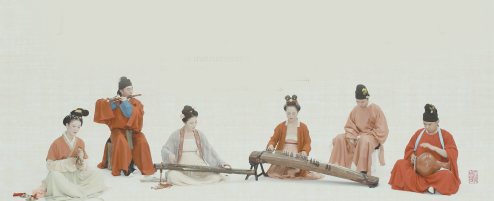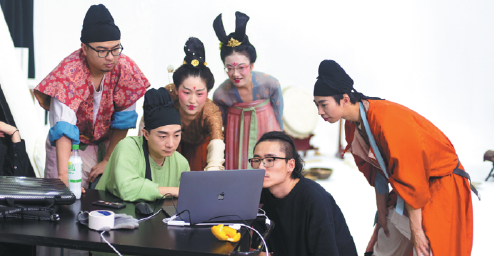In harmony with the past
Ancient instruments that evoke another era now deliver modern melodies thanks to an innovative group of musicians, Xing Wen reports.

Its sound seems to evoke the very essence of China. Its soothing notes seem to fade into the distance, beyond rivers and snow-capped mountains. But the ancient instruments, such as the guqin, or the seven-stringed Chinese zither, with more than three millennia of history, are finding a new lease of life as their strings are plucked to deliver modern tunes.
Members from the Zide Guqin Studio are challenging preconceptions about the instrument with harmonies redolent of the modern day.
Since the Shanghai-based studio was founded in 2014, its members have been using guqin to perform hit modern music, including the theme songs from the British TV series Sherlock, American TV saga Game of Thrones, Japanese anime Doraemon and even the popular mobile game Honor of Kings.
Playing modern pieces on the zither requires the musicians to use the instruments in a manner they are not used to.
The hit tunes they've adapted are available to the public for free and can be taught in the studio's training sessions, online and offline, encouraging people to join them to explore the variations.
The studio's music videos, released on social media, have provided not only a feast to the ears but to the eyes.
In one video, six musicians, playing the guqin, guzheng (Chinese zither), pipa (a four-stringed Chinese lute), xiao (a vertical bamboo flute) and other traditional instruments, perform the theme song of hit Chinese thriller series, The Longest Day in Chang'an, which is set during the Tang Dynasty (618-907).
Their costumes, makeup and hairstyles all seek to reproduce the distinctive fashions of that dynastic period.
Against a light amber backdrop, the arrangement of musicians and props in the frame, as well as the euphonious notes flowing out from the musical instruments, blend well together.
These visually and acoustically pleasing music videos have garnered nearly 20 million views on the Chinese video-sharing platform Bilibili, and reached large audience overseas, with one video notching up around 15 million views on YouTube.
"We want to create, within our power, a visual effect that suits the style and conception of the piece we play," says Tang Bin, 35, the artistic director for the studio.
He adds that the most time-consuming part for producing a stylish guqin music video is not the preparation of the setting, clothing or filming, but transcribing and arranging a melodious piece for the guqin and the other traditional instruments that are paired with it.
The guqin, with its refined and delicate timbre, is often used by Tang to give off a meditative ambience through the intro and conjure varied moods when building to the crescendo.
To bring out the best of the instrument in an ensemble, Tang has utilized a range of techniques and other instruments to amplify the sound while ensuring quality and fidelity.
Variety is the key and, after a traditional introduction, more instruments come into play, ranging from the xiao and the "hang drum" (which originated in Switzerland and resembles a pot cover) to the African Udu drum. But the guqin's centerpiece role is enhanced in providing the rhythm and harmony base in the band.
Combining guqin with diverse instruments has given Cai Shan, 34, an added zest. Cai, a founder member of the studio, learned the guqin at the Tianjin Conservatory of Music.
She says that in university, she was unwilling to stage solo shows in a music hall, where the guqin player had to keep apart from the audience, which makes the subtleties of the guqin barely audible for those in attendance.
"I like to sit closer to the audience when I perform so people can catch the subtle emotions I articulate through rubbing the strings," she says. "Now I can fully express my sentiments when playing music with other guqin lovers from the studio."
Another thing she likes about the studio is that she used to perform just a handful of ancient, classical pieces in conventional shows, but now, as a group, they "play the hottest new releases on guqin" while clad in gorgeous garments that highlight the fashions of a bygone era.
A different tune
Most of the innovative endeavors they've made to deliver a guqin-centered performance aim to nurture a larger group of receptive listeners and even enthusiasts for the time-honored instrument, especially among the younger generation.
Another studio member Bai Wuxia, 28, knows how to go a step further in that direction.
Her interest in the guqin first appeared when she was in primary school through reading the martial arts novels of Hong Kong writer Louis Cha.
"Many fictional characters in his books play the guqin, which gave me a vague but romantic impression of the instrument," recalls Bai.
At that time though, it was hard to find a proper guqin class in her hometown of Changsha, Hunan province. She didn't actually get to touch the instrument until her summer vacation in 2010.
Back then, the high schooler had just finished gaokao, or the college entrance examination, and followed the suggestion of her father, a materials science professor, to major in his field of expertise. She enrolled in the Sino-European School of Technology of Shanghai University.
As a reward, her parents found Bai a guqin studio located on western Changsha's Yuelu Mountain, where she learned the fundamentals of the instrument.
At university, she joined a music club focusing on traditional Chinese instruments, but the club struggled to attract more young enthusiasts.
To bring in more students, she came up with the idea to collaborate with their school's kung fu club and stage a musical themed around martial arts. The musical was a hit. It helped the club become more popular. It not only attracted more members, but also paved the way for them to perform at a theater festival in Shanghai.
After her graduation in 2015, she joined the Zide Guqin Studio. The following year, Bai helped the studio stage its first commercial show at a local theater.
After that, the studio started to hold regular concerts for guqin enthusiasts, who relished the prospect of attending a live show.
Additionally, Bai also posted her solo shows on the short video-sharing platform Douyin, performing both time-honored tunes and modern compositions, which won her more than 400,000 followers.
"The algorithm will recommend my videos to many people who don't know much about guqin, enabling them to enjoy its charm. That might lead to a higher level of public appreciation someday," says Bai.
The studio has certainly drawn people's attention to the instrument and its repertoire.
About 1,500 students from across the country are following the group's online guqin training sessions, and nearly 70 percent of them are aged between 16 and 30.
"The key for guqin to be passed down in a sustainable way is to grow its fan base-getting more people interested in the ancient art," says Zhu Liyue, manager of the studio. "The more diverse the ways we use to approach it, the more fascinating it will be."
Zhu, who majored in computer engineering, was captivated by the guqin in 2009 since he found that it has a unique ability to soothe the mind.
"Intensive practices were very boring at the start," Zhu recalls of his learning experience, "but, after my two-hand technique reached a certain level that allowed me to freely express myself using the instrument, it brought me so much fun."
He also points out that learners should treat the guqin as a common member of the instrument family, rather than something that should be put on a pedestal.
The studio has pledged to produce a series of programs to get the public closer to guqin and other traditional instruments, and release more videos that recreate the image of ancient people with background music provided by guqin players, Zhu says.


Today's Top News
- Xi urges studying, absorbing netizens' opinions in formulating 15th Five-Year Plan
- Yuan eyes greater role among safe-haven assets
- China set to clean up online health content
- China, EU can shape climate governance
- Chengdu gearing up for World Games
- Beijing, Kathmandu aim for new heights in relations






























